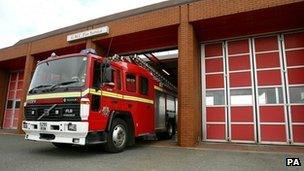Fire service needs transforming, says government review
- Published

Sir Ken Knight found variations in the amount different fire and rescue authorities were spending
Fire and rescue services in England need to be "transformed" to become more efficient and effective, .
Sir Ken Knight said incidents were down 40% over the past decade but the number of firefighters was roughly the same.
Former chief fire and rescue adviser Sir Ken said having 46 separate authorities was not "sensible".
The Fire Brigades Union (FBU) described the review as a "fig leaf" for increased cuts to the fire service.
Sir Ken's ideas for the future included the creation of a single fire service for England, mirroring Scotland's system.
Ideas for debate
Sir Ken, who recently retired as the government's chief fire and rescue adviser, also found inexplicable variations in the amount different fire and rescue authorities were spending.
After finding that, in some areas, services cost twice as much to provide as they did elsewhere, he suggested tens of millions of pounds could be saved every year.
Sir Ken said many local authorities were considering ways to save money in fire services - including mergers, new shift patterns and greater use of part-time firefighters.
Sir Ken Knight: "There will be an adjustment of numbers, of jobs, of people"
But he warned the "scale of change is unlikely to be achieved through local action alone".
The review noted little change in expenditure and personnel levels despite the decrease in the number of callouts.
Although the report made no firm recommendations, it listed a number of ideas for future debate.
These included more collaboration between fire and other emergency services and the possibility of a single fire service for England.
The report's suggestion that services could be privatised was dismissed by a government spokesman who said ministers had "publicly ruled this out".
Fire service cuts
Matt Wrack, general secretary of the FBU, criticised the report as "a fig leaf for slashing our fire and rescue service to bits".
Matt Wrack, Fire Brigades' Union: "The fire and rescue service has been slashed to pieces"
"David Cameron has promised to protect front-line services. That has been exposed as a lie over the past three years as the fire service has faced the biggest cuts in its history."
He said 1,200 firefighter jobs had been cut in the past year and the cutbacks had resulted in "a poorer service for the public".
Later, speaking on 91Čȱ¬ Radio 4's Today programme, Mr Wrack discussed a forthcoming study by the Department for Communities and Local Government that he said would show "reaction time has increased… and it will show it has resulted in additional deaths and additional fire losses".
He also criticised Sir Ken's plans to decrease the number of full-time firefighters.
He said: "In a full-time fire service, firefighters are available in a matter of seconds - a huge difference in time from someone mobilised from home."
'Cuts cost lives'
Sir Ken insisted the review was about adjusting the service to current needs, not cutting it.
He said: "When I was a firefighter, fire deaths in the home were 700 and 800 a year. Now, they're 180 a year.
"It's a really good news story, but the service itself must adapt and change, not only to maintain that fire safety and prevention front, but to adapt its service.
"So why have - even though those fires have gone down 40% - the number of firefighters remained broadly the same.
"It's a question that the local authorities and fire authorities will need to address and need to answer."
He told the Today programme "increasing retained [on-call] firefighters from 10% to 40% would save ÂŁ130m".
But speaking at the FBU's conference in Blackpool on Friday, TUC general secretary Frances O'Grady said the reduction in deaths from fire was "mostly down to the preventative work that firefighters are doing out in the community".
"Cuts cost lives," she said. "Every part of the country is at risk from this postcode lottery of cuts and closures."
Ministers will now consider the findings.
The Scottish Fire and Rescue Service was created on 1 April, replacing the country's previous eight regional services.
The Scottish government said savings could be made by pooling resources into one, therefore protecting front-line staff and services.
There is a new headquarters in Perth, with three operational "hubs" in the north, west and east of Scotland.
- Published17 May 2013
- Published17 May 2013
- Published17 May 2013
- Published29 March 2013
- Published10 February 2013